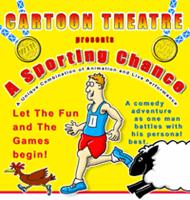
A sporting chance for arts-based legacy
James Bryce, Scottish arts correspondent for The Leisure Review, considers the penetration of 2012-related joie de vivre beyond the M25.

At the time of writing the Grand Torch Relay is wending its way through Wales with Englishman Chris Bonnington pictured atop Snowdon in some of the national dailies and a host of local heroes doubtless filling the inside pages of the Montgomery Messenger and the Llanelli Leader. The brand-makers at LOCOG have always held that the public would get behind the Games when the torch began to be processed and, despite having to accept Will.I.Am, Chris Moyles and the like being parachuted in by shameless “presenting partners”, the scandal of torch-bearers seeking to recoup the cost of their individual commemorative torches by flogging them on E-Bay and a general air of metropolitan venality trailing the whole, gaudy caravan, they seem to be right.
It remains to be seem whether the genial optimism evidenced so far survives the entire proceeding but it has to be said, for the moment, touch wood (or gold-effect aluminium if you are bearing a torch as we speak), that the Olympic Games may just have a resonance beyond the M25. Buy why has that outcome been in doubt?
For everyone North of Hatfield, there is the difficulty of London. Fair do’s, it is the capital city but perceptions elsewhere are still reeling from the construction of the upside-down pudding bowl at Greenwich for the Millennium and the expectation that we would all rejoice. In spite of moves by the BBC et al to involve the regions more, the vital decisions are still made from the south-east. Perhaps siting the Games somewhere more central (Glossop, for instance) might have shifted the balance?
Will the Olympics make a difference? Will it bring us together? Will there be a legacy? And will we recognise it? That logo for instance still bears a strong resemblance to one of these how-the-hell-do-you-stick-this-together puzzles that fall out of Christmas crackers and if the legacy of the Games is as opaque as that a great deal of money will have been wasted and promises broken.
Having said all that, yes it might. The Games are certainly uniting the musical fraternity who have been asked to play for free in return for the great opportunity of being seen. The request alone has caused uproar from the Musicians' Union and that is before the reaction to the karaoke at the opening ceremony. It's so 'now', isn’t it? But all that is just the Arts being arty and everybody knows that when it comes down to it the Arts is just playing about. They are not really important, just a fair-enough reason for creaming off a lot of the Arts Council budget to fund the Games.
Thankfully, not all the Arts Council budget has been shunted into the siding that is the opening ceremony. On a small island somewhere off the coast of northern Scotland a couch potato wins a ticket to the Megagames. Problem: he has to get there by 5 pm. His hectic journey involves running, swimming, sword-fighting, hurdling, cycling, pole-vaulting; in a word, a great number of the sports which will feature in the Games themselves – and by the time he gets there, by golly, he is fit. He features in A Sporting Chance, a play that has already toured the Western Isles and takes to the road again this month in the Scottish Highlands.
Written and produced by Cartoon Theatre, it features only one actor and computer-generated animations. It is ingenious, amusing and spreads the message that sport, in essence, is an intensifying of things we all do in one way or another. Delivered to audiences of children, their carers and their communities, it leaps the chasm between Lerwick and London, and, by showing where the arcanery of Olympic sport came from, makes participation locally seem like a step on the same spectrum of activity. It is legacy but not how Seb Coe knows it. And, as a bonus, it can be reused when Glasgow hosts the Commonwealth Games in a couple of years.
Maybe this is the kind of thing that will create positive attitudes to the Olympics in places far removed from the centre of power. With the reservations mentioned above, together with the stiff ticket prices and the who-can-afford-to-make-their-way-to-the-smoke-if-you-managed-to-get-a-ticket-that-is issues, the real effect of the Olympics may come from localised ventures using the Olympics as a springboard to action.
And let's hope it is action.
The Leisure Review, June 2012
© Copyright of all material on this site is retained by The Leisure Review or the individual contributors where stated. Contact The Leisure Review for details.
Download a pdf version of this article for printing